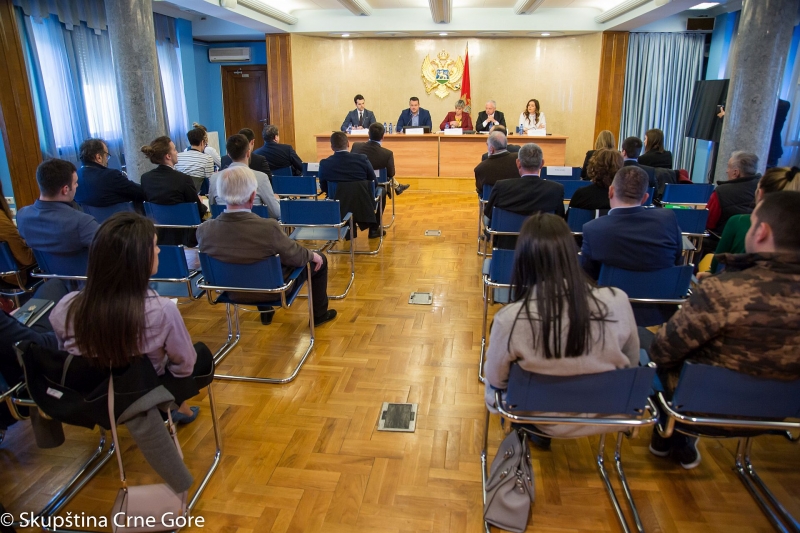Public debate of the Committee on European Integration on “Montenegro and the EU - Chapter 8: Competition” was marked by a discussion on the results achieved so far within the concerned chapter, and readiness of Montenegro to provide the most favourable conditions for its citizens during the negotiations with the EU in this field. Within the constructive dialogue of the interested public and representatives of the relevant institutions, they also discussed key challenges and the activities required in order to reach the desired standard.
In his opening remarks, Deputy Chairperson of the Committee on European Integration Mr Adrijan Vuksanović reminded that one of the important tasks of the Committee was to inform citizens thoroughly on Montenegro’s accession process to the EU, while the organisation of public debates enabled an opportunity to hear, in direct conversation, different opinions on the state of affairs and challenges in the important fields negotiated by Montenegro and the EU. Mr Vuksanović said that, ahead of the Committee meeting where the negotiation position for the said field would be considered, it was important to hear comments which could contribute to better position and consider steps that Montenegro should undertake in the upcoming period.
Speaking about the content of the chapter, Head of the Working Group for Chapter 8 and President of the Council of the Agency for Protection of Competition Mr Miodrag Vujović said that market economy was a foundation of every developed society, responsible for general development, and in this sense emphasised that this chapter, inter alia, included the consideration of a possibility for entering the European market, long-term business operations in Montenegro and inflow of new capital as well as the control of the market itself and prevention of monopoly. Aside from this, Mr Vujović explained, this chapter includes the issue of granting state aid, to which Montenegro is committed by the Stabilisation and Association Agreement, harmonising its legislative framework with Articles 107, 108 of the Treaty on the Functioning of the European Union. Negotiator for this chapter and Director General of the Directorate for Internal Market and Competition at the Ministry of Economy Ms Biljana Jakić reminded that opening benchmarks that Montenegro was supposed to meet for opening chapters were related to harmonisation of provisions with the EU acquis, building of institutional framework and capacities, and requests in relation to measures of state aid.
Deputy Chief Negotiator Mr Marko Mrdak praised the cooperation with the Committee on European Integration, stressing that this was the last of the series of debates devoted to negotiation chapters, organised ahead of consideration of positions. He expressed pleasure with the joint work and announced activities and actions in the upcoming period, sharing the opinion of the Deputy Chairperson of the Committee that chapter 8 would be opened by the end of Romanian Presidency. In conclusion, he said that Montenegro was internally ready to close six chapters, namely: 6, 7, 10, 20, 21 and 28.
During the discussions, participants of the debate were interested in issues such as unfair competition, transparency of granting state aid, capacity of the Agency for Protection of Competition, appeal procedures and similar.
The debate concluded that the legislative framework was mostly harmonised with the EU acquis, but that the results of the said Agency and other relevant institutions, would determine the negotiation pace and work on closing one of the most important chapters in the negotiations process.












